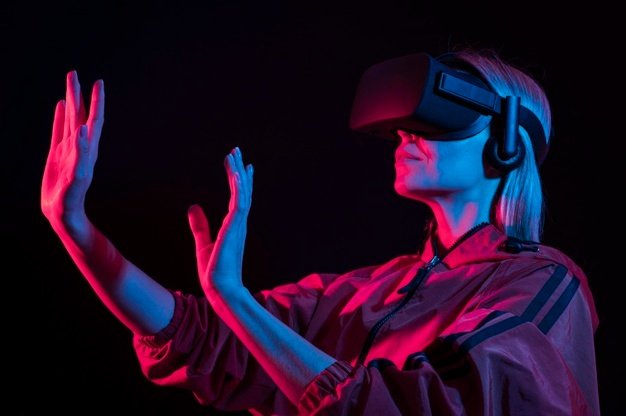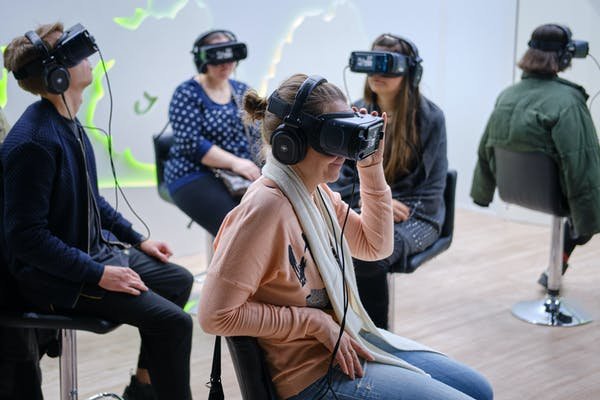In the wake of Facebook rebranding as Meta, reflective its specialize in the “metaverse”, Microsoft has currently declared it, too, can start this space.
Meta has planned that the metaverse will eventually permit North American nation to interact across education, work and social contexts, whereas Microsoft appearance to be focusing specifically on the realm of the virtual workplace for now.
however what actually is that the metaverse and to what extent ought to we have a tendency to believe that the vision being bestowed to us is de facto aiming to be central to our daily lives?
the concept itself isn’t new. phantasy author Neal Stephenson coined the term “metaverse” in his 1992 cyberpunk novel Snow Crash, presenting a 3D virtual world during which people, diagrammatic as avatars, may act with one another and unnaturally intelligent agents.

As with any huge vision of a future that doesn’t nonetheless exist, many folks have tried to stamp their own definitions on the metaverse. If the thought is new you, it should facilitate to grasp a number of the properties you'll be able to expect from a metaverse.
A virtual world: this is, in my opinion, the foremost vital characteristic of a metaverse. you'll explore it employing a computer, diversion console, mobile, wearable technology or alternative device, experiencing 3D graphics and sound on the way. the thought is that this causes you to feel additional gift within the metaverse, and presumptively less gift within the everyday world (where your body pig-headedly remains).

Virtual reality. You need a virtual reality headset for this. The idea here is that you become immersed in the virtual world, so you feel even more present – at least until you bump into something that remains in the everyday world, like the coffee table.
Other people. The metaverse is social. There are lots of other people there, represented as avatars. Some of these avatars might be bots, virtual agents and manifestations of artificial intelligence. You can hang out with the other people or even do things together. The social aspect is likely to be central in Facebook’s metaverse given its history as a social network.
Metaverse fans and some researchers believe communication may be more natural than with video conferencing because, for example, you can use gaze to show who you are addressing (your avatar can turn its head to look at another person). Your avatar could also walk over and sit next to someone else’s avatar to start a conversation.Persistence. This means the virtual world is available whenever you want to visit it. You can change it by adding new virtual buildings or other objects and importantly, the changes remain in place next time you visit. You might be able to take up residence and own a bit of it. The metaverse will rely on your user-generated content – your digital creations and personal stories – in the same way social media does today.
Connection to the real world. In some visions of the metaverse, the virtual stuff in the virtual world actually represents real stuff in the real world. For example, you might fly a virtual drone in the metaverse to steer an actual drone in the real world. People talk about the real and virtual as being “digital twins”.
What can I do in a metaverse, and how soon?
Different corporations will probably have their own visions or even local versions of the metaverse but, like the internet, they will all be connected, so you can move from one to the other.
It’s likely that some things are going to be more immediately appealing and practical than others. Playing games would seem to be a reasonable leap, as many gamers already enjoy online gaming, and some games, to a degree, have already entered the metaverse (think back to the characteristics above).
The idea of being able to socialise or meet with others, and feel like you’re really there with them in person, is also appealing – particularly in today’s pandemic age.
We don’t have a particularly clear idea of Meta’s metaverse offerings yet. In announcing the rebranding, chief executive Mark Zuckerberg mentioned different possibilities. You might be able to appear in a real meeting as a hologram, or play chess with someone across the world on a virtual chessboard superimposed on the real world.

Facebook’s vision of the metaverse is as being our future interface to the web. however whether or not we are going to in some unspecified time in the future access all internet services through 3D virtual worlds and computer game headsets remains to be seen.
Headsets still seem to be a somewhat niche technology in spite of the many giant corporations’ makes an attempt to bring them to promote in recent years, together with Facebook with their purchase of Oculus.
i think Facebook will have to be compelled to be during this for the long-standing time which their vision of the metaverse continues to be a few years off turning into a (virtual) reality.
A final observation
Stephenson’s original vision of the metaverse was very exciting, but also full of possibilities for both online and real world harms, from addiction, to criminality, to the erosion of democratic institutions. Interestingly, Stephenson’s metaverse was mostly owned by big corporations, with governments relegated to being largely insignificant paper-shuffling outposts.
Given the current tensions between big tech and governments around the world over privacy, freedom of speech and online harms, we should seriously consider what kind of metaverse we want to create, and who gets to create, own and regulate it.